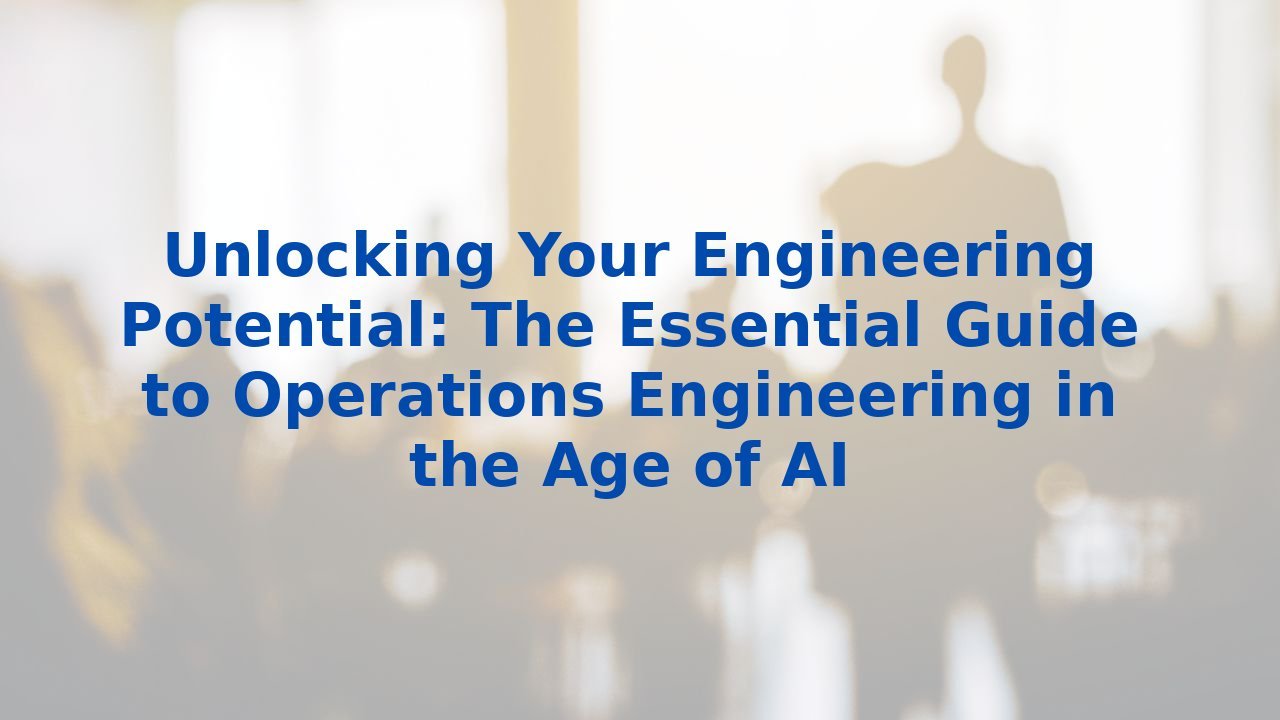Unlocking Your Engineering Potential: The Essential Guide to Operations Engineering in the Age of AI
Unlocking Your Engineering Potential: The Essential Guide to Operations Engineering in the Age of AI
Introduction
Operations engineering is the backbone of any organization, ensuring that everything runs like a well-oiled machine. But as the digital age unfolds, traditional processes have begun to show their limitations. Artificial intelligence (AI) has emerged not just as a tool, but as a transformative force in the field, poised to elevate operations engineering to new heights. This guide will explore how AI enhances key business processes and delivers lasting value, all while boosting efficiency within your organization.
General Business Processes Enhanced by AI
Before diving into the nitty-gritty, let’s spotlight the core business processes that AI revolutionizes:
Automation of Repetitive Tasks
In the world of operations engineering, mundane tasks can consume valuable time and resources. AI steps in by automating repetitive processes such as data analysis and inventory management. This lets skilled engineers redirect their focus toward strategic projects that add real value, fostering innovation and creativity.
Improved Decision-Making
AI isn’t just a time-saver; it elevates the quality of decision-making. With advanced data analysis tools, AI can dissect large data sets to yield insights that humans might miss. This precision ensures that decisions across various sectors—be it marketing or supply chain management—are supported by data-driven truths, fostering greater confidence in leadership.
Enhanced Customer Experience
In an era where customer preference dictates success, AI can personalize interactions. By analyzing customer data, it can refine service offerings and recommendations, cultivating deeper engagement and loyalty. When customers feel understood, they are more likely to stick around and advocate for your brand.
Cost Reduction and Resource Optimization
AI-driven automation extends beyond mere efficiencies; it delivers measurable cost savings. By predicting customer demand and optimizing inventory, organizations can work with leaner operations and cut down on waste. The result? Healthy savings that can be redirected toward growth and innovation.
Innovation and Competitive Advantage
In sectors like pharmaceuticals, generative AI is reshaping the landscape by aiding in drug design and compound efficacy predictions. Here, AI turns the wheels of innovation, offering companies a leg up in an increasingly competitive market.
Benefits of AI for Improving Efficiency
Now, let's delve into the tangible benefits AI brings to the operational table:
Streamlined Workflows
AI's automation capabilities facilitate the streamlining of workflows, allowing teams to move swiftly without getting bogged down in low-value tasks. This refocused energy brings a surge in productivity and efficiency across the organization.
Enhanced Productivity
Anticipating trends is key, and AI excels at analyzing sales data for future demand predictions. With these insights, organizations can strategically adjust inventory levels, mitigating the risks of overstocking or stockouts, which in turn translates to higher profits.
Improved Accuracy and Reliability
Human error is an inevitable variable in any process. AI can identify patterns and offer solutions that significantly reduce mistakes. As operational reliability improves, so does the overall safety and security of business operations.
The Importance of Training Employees for AI
While integrating AI into operations is transformative, the success of these initiatives rests heavily on employee readiness. Here’s why training is not just beneficial, but essential:
Skills Development
Equipping employees with AI-related skills—including data analysis and machine learning—can dramatically improve their ability to utilize these technologies effectively. For young engineers aspiring to excel in operations engineering, this knowledge becomes a critical asset.
Adaptability and Innovation
AI is not a static solution; it evolves as the landscape changes. Training programs that cultivate adaptability will help employees seamlessly integrate AI into existing processes and uncover new opportunities for innovation.
Ethical Considerations
AI is a powerful tool, but with power comes responsibility. Training must encompass the ethical implications of AI, ensuring employees grasp the importance of data privacy and fairness in AI decision-making.
Conclusion
In summation, AI stands as a beacon of progress for operations engineering, streamlining tasks, enhancing decision-making, and fostering exceptional customer experiences. The potential of an AI-empowered workforce can be fully realized only through a commitment to training and skills development. By fostering a culture that embraces innovation and adaptability, organizations can not only thrive in the present but also lay the groundwork for a robust engineering future.
Investing in AI and its training isn’t merely a trend; it’s a transformative journey toward a more efficient, innovative, and resilient organization.



